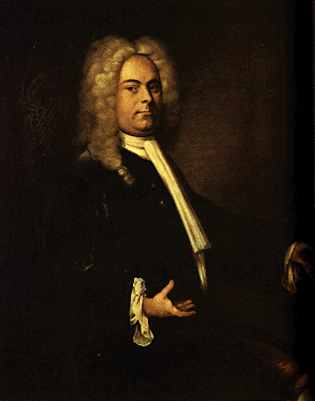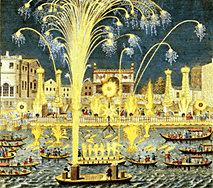George Frideric Handel
Born: Halle, February 23, 1685
Died: London, April 14, 1759
 Born in the same year and country as Johann Sebastian Bach, young Georg Friederich Händel (the original German spelling of his name) was playing the violin, harpsichord, oboe, and organ by the age of eleven. Drawn to the theater from an early age, Handel went to Hamburg in 1703 and began composing Italian operas. From 1706 to 1710, he sojourned in Italy where he met both Domenico Scarlatti and Arcangelo Corelli, and came under the influence of Italian melody. Upon his return to Germany, Handel became Kapellmeister to the Elector Georg of Hanover. Unhappy with his duties there, however, Handel made a trip later in 1710 to London, where Italian opera was fast becoming all the rage. He produced an opera to great acclaim in London and, having tasted success, reluctantly returned to Germany. Obtaining permission to return to England in 1712, Handel once again composed several operas as well as some ceremonial music for Queen Anne. The Queen gave the young composer an annual stipend of £200 in hopes of keeping him in London as court composer. Handel never did return to Hanover. He remained in England for the rest of his life, becoming a naturalized citizen in 1726 and anglicizing his name to George Frideric Handel. A potentially embarrassing situation arose for the composer when Queen Anne died in 1714 and was succeeded by King George I -- the very Georg of Hanover to whose court Handel had never returned! But relations between the two must have remained amicable, for Handel's royal stipend was doubled before too long, on top of which he was granted another stipend from the Princess of Wales.
Born in the same year and country as Johann Sebastian Bach, young Georg Friederich Händel (the original German spelling of his name) was playing the violin, harpsichord, oboe, and organ by the age of eleven. Drawn to the theater from an early age, Handel went to Hamburg in 1703 and began composing Italian operas. From 1706 to 1710, he sojourned in Italy where he met both Domenico Scarlatti and Arcangelo Corelli, and came under the influence of Italian melody. Upon his return to Germany, Handel became Kapellmeister to the Elector Georg of Hanover. Unhappy with his duties there, however, Handel made a trip later in 1710 to London, where Italian opera was fast becoming all the rage. He produced an opera to great acclaim in London and, having tasted success, reluctantly returned to Germany. Obtaining permission to return to England in 1712, Handel once again composed several operas as well as some ceremonial music for Queen Anne. The Queen gave the young composer an annual stipend of £200 in hopes of keeping him in London as court composer. Handel never did return to Hanover. He remained in England for the rest of his life, becoming a naturalized citizen in 1726 and anglicizing his name to George Frideric Handel. A potentially embarrassing situation arose for the composer when Queen Anne died in 1714 and was succeeded by King George I -- the very Georg of Hanover to whose court Handel had never returned! But relations between the two must have remained amicable, for Handel's royal stipend was doubled before too long, on top of which he was granted another stipend from the Princess of Wales.
Throughout his career, Handel continually composed much wonderful instrumental music, including many fine organ concertos, a good amount of keyboard music, and celebratory music such as the suite of airs and dances known as the Water Music, written to accompany a royal barge trip down the Thames in 1717. There is also the Musick for the Royal Fireworks, composed in 1749 to celebrate the peace of Aix-la-Chappelle, which had been declared the previous year. Following the model of Corelli, Handel also completed two sets of concerti grossi, some of the finest examples of the genre from the late Baroque, an example of which is the Concerto Grosso, Op. 6 no. 5. Of course, he was obliged to compose much choral music for the court, too. Among these works are the anthems written for the Duke of Chandos, various odes, and the four majestic Coronation anthems from 1727.

But these compositions were incidental to Handel's main reason for having settled in England: the composition and production of Italian opera for a fashionable and eager audience. And produce them he did, becoming as much involved with the business end of things as with the creative. Beginning with Rinaldo in 1711, Handel rapidly composed over forty operas between 1712 and 1741. Many of these met with great success and brought Handel a great deal of fame and money. Some of the more famous of these operas are Giulio Cesare (1724), Alcina (1735), and Serse (1738). Many of these scores contain much fine music, and an aria such as "Or la tromba" from Rinaldo illustrates the pomp, grandeur, and vocal virtuosity to be found in the Italian operas of the late Baroque. Yet as dramatic entertainment these works fail to stand up today, mostly because of the ridiculously stilted librettos to which they are set. Indeed, even at that time it was recognized that some changes had to be made, and within the next thirty years, Christoph von Gluck began implementing those changes. Although Handel's operas were immensely popular when they were written, by the 1730s public interest in opera had faded considerably, and Handel ended up losing a great deal of money continually attempting to find further success in the genre.
Eager to find a new audience, Handel turned to the composition of oratorio: dramatic, non-staged works for the concert hall, usually with a great deal of choral music, and most often with a Biblical subject, the text in English. His first such composition (Esther) had been written in 1732, and its success was followed with other oratorios. By 1740 Handel had already composed two of his greatest works in the genre, Saul, and Israel in Egypt. Handel infused these Biblical stories with the melody, majesty, and drama he had previously lavished on his operas, and such works as Solomon, Jephtha, Samson, Joshua, Israel in Egypt, and Judas Maccabeus brought the composer ever more fame and recognition. But Handel's genius is nowhere more evident than in the sublime music he provided for his most famous oratorio, Messiah, which had its premiere in Dublin in 1741. Its success was immediate and resounding, and the work has never been out of the repertory since. The incredible successes of Handel's oratorios made a deep and lasting impression on English music for the next century, and no native-born musicians were able to gain a foothold with the public due to their continuing popularity. Not until the Nationalist movement of the late eighteenth century would England produce any composers of lasting international stature.
In 1751, Handel began having trouble with his eyes. He endured three operations on his eyes at the hands of the same surgeon who had unsuccessfully operated on Johann Sebastian Bach, and the results were the same -- complete blindness. Handel kept performing though, and died a week after suffering a collapse following a performance of Messiah in 1759. He was buried in state in Westminster Abbey. A biography of Handel was written the year after his death by the Reverend John Mainwaring -- the very first biography to be written of a composer.
